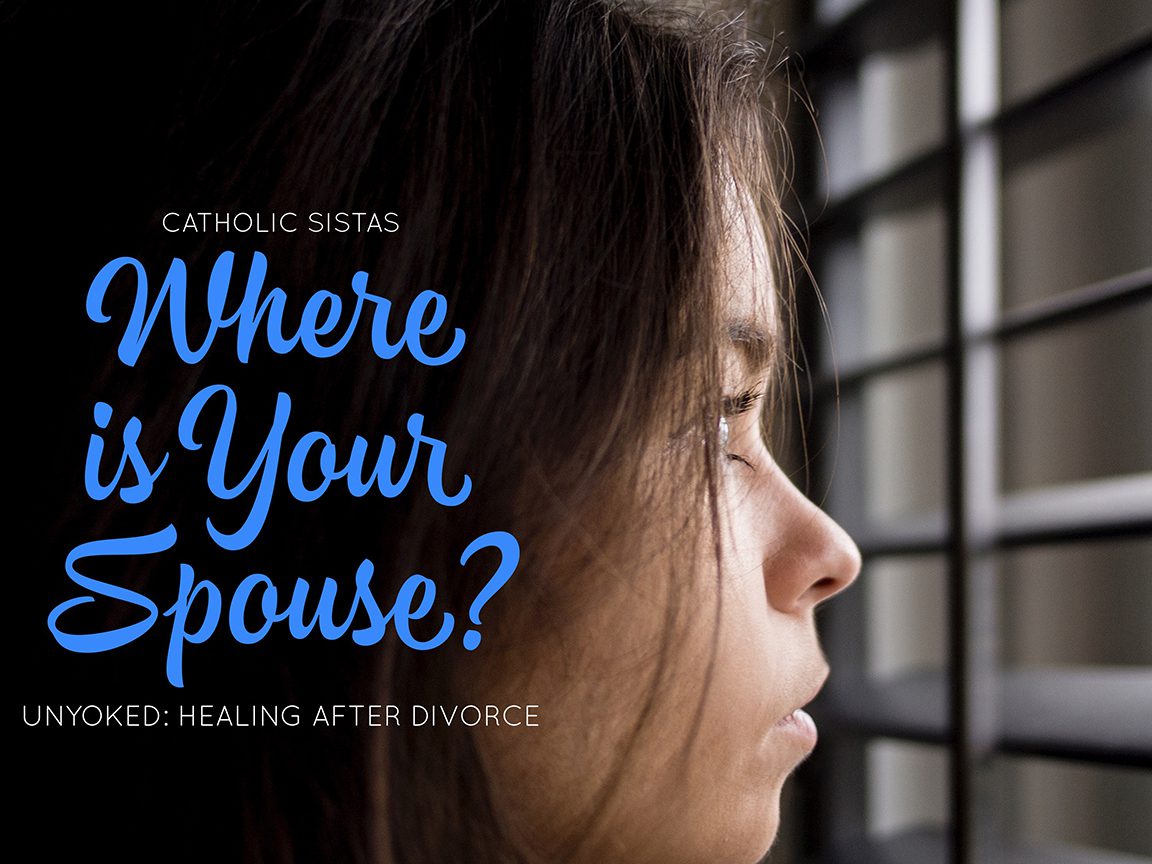
Welcome to the first installment of UNYOKED: Healing after Divorce. This series will answer some questions and address some common issues that divorcees face while still trying to live out the Faith. We will share some personal experiences, some stories from other divorcees, explore what the Church teaches, the process of annulment, and try to answer some of your questions as they come up.
As Catholics we are called to live out our vocations faithfully focused on Christ and trusting the Church to lead us. As we know, the vocation of marriage does not always end in “happily ever after,” but sometimes in divorce. Though stories of broken lives are as unique as the people who experience this heartbreak, one thing is still true: these individuals are still called to holiness. And we, as the body of Christ, are to embrace and pray for our fellow brothers and sisters in their joys and trials, which may include divorce.
If you happen to be a faithfully practicing Catholic, and are also a divorcee, you may experience a certain awkwardness while still attempting to be actively involved in the Church. Articles that speak of how to faithfully practice the faith in a deeper way with your spouse may tug at your heart strings, while you think to yourself, “I really wanted that for us”, or “I always thought that our life would be like that.” Seminars on how “you and your spouse can be good examples of a faith filled marriage” may sting a little bit, but you’ll still try to incorporate those ideas as best you can all while still single-parenting. Perhaps amidst the brokenness, your ex isn’t in agreement in raising your children in the Faith, and so you struggle to instill in your children the Truth knowing they will receive information contrary to that over the weekend with the other parent. The scenarios can be many, but the weight behind them is the same. You don’t fit the projected ideal anymore. A perspective shift is needed both within yourself, and respectfully from others.
Take, O Lord, and receive my entire liberty, my memory, my understanding and my whole will. All that I am and all that I possess, Thou hast given me: I surrender it all to Thee to be disposed of according to Thy will. Give me only Thy love and Thy grace; with these I will be rich enough and will desire nothing more. Amen.
It will happen to every divorcee in a different way, but the question will still happen. When you’ve been married, and then you get divorced, unless you’ve made a public service announcement someone is bound to feel the need to ask where your ex is. Maybe they haven’t seen you in a while, or they noticed your spouse gone and wonder about work taking them away. Call it morbid curiosity, natural curiosity, gossipy curiosity. As uncomfortable as it may make the recipient of the question, I’ve come to the conclusion that it is a natural question to ask. So let’s take a look at this question and it’s complexities for the divorcee.
Taken at face-value this is a rather innocent question. You don’t see someone, or haven’t seen someone in a very long time and so you wonder where they are. One time, my now ex husband saw an old acquaintance at church and asked how her husband was doing. Her face dropped and she explained that he had passed away suddenly the previous winter. Awkward. And tragic. Life is filled with these moments. It is a different case losing a spouse to death than losing a spouse to divorce. The caveat in the case of divorce is that it’s never easy, never peaceful, and is never really over especially if you have children. The pain of your loss may continue for years or decades. With death, you have a grief that morphs over time into something that you learn to live with and accept as part of the circle of life. In the case of divorce, there may have been unimaginable things taking place behind closed doors, and divorce often times exacerbates these issues. Someone who is attending Mass on a regular basis is obviously trying to live the faith, and this question is heart wrenching. They are suffering a different kind of grief. One that is on-going and changes with the changing circumstances, perhaps with an ex living in sin after having abandoned the faith or other perhaps hurtful behavior. How we thought we would be living out the faith as a family unit has changed dramatically. Consider that a person may be suffering a different type of grief as their spouse abandoned them with their children, and so they actually can’t tell you where their ex may be. Hence their solo attendance at Mass. Perhaps drugs were involved. Maybe the ex is living with the “other woman”, and that’s too embarrassing to admit so they grapple for what to say. It doesn’t matter what the circumstance is, it is a difficult question to answer, to admit to out loud.
The easiest and more straight forward answer is best for the divorcee. “I am divorced.” But that isn’t to say that even saying that simple phrase is not gut wrenching as well. Not only may the circumstances of the divorce be painful, but for someone still trying to live the faith it is almost as if we are admitting to defeat. A spouse can file divorce for almost any reason, or no reason (irreconcilable differences), often times taking the other party by surprise and leaving them devastated. And the surprise isn’t because a spouse is ignorant to the fact that there were problems within the marriage, but rather it comes from feeling betrayed that the other person felt that there is no hope in making it better or in seeking out more help. Perhaps even a little betrayal that God didn’t intervene or listen to the prayers of our heart. Then… It feels like you are being judged, by what is supposed to be a community of loving supportive faith-filled people, as having given in to the easy push of society telling us that “if it is hard you can just say you’re done trying”. The word “divorce” alone carries a stigma within the community of faithful. It is still so incredibly prevalent for many people within the church community, and of a certain age (think pre-70’s era), to automatically assume you didn’t put in enough time or effort trying to make your marriage work. This isn’t to imply that you should not ask this question. It is a natural question to ask. It is in how we respond to the answer that we can make a person feel welcomed to God’s Mercy, or made to feel that they will be labeled by their circumstances.
Here is where compassion comes into play. We can’t know what was taking place in someone else’s marriage that ultimately made it end in divorce, and really it’s not our business to ask. But what is our business is to be compassionate to them as a person worthy of dignity. Scripture tells us to pray for our brothers and sisters in Christ, for their needs. (One of the gifts of the Holy Spirit is Kindness!) It is one thing to correct someone in their ways if it is blatant and disrespectful. If someone that you encounter at church has revealed to you that they are divorced they are likely seeking an annulment, and/or at the very least healing. Or, perhaps the circumstances of the divorce (maybe it is dragging out due to high-conflict divorce proceedings) may leave this person feeling broken and unable to seek an annulment at this time. But I can guarantee that if they are showing up to church on a consistent basis, and for all intent and purpose living the faith, they are seeking God’s Mercy and compassion over their situation.
For the divorcee, in time this question and how to answer it will become more clear to you. “I’m divorced.” Simple and to the point. If you end up being close friends with the person who asks, time will help you to decide if revealing the circumstances is necessarily something you want to do. Don’t feel you need to reveal the circumstances of your divorce. This is where you have the power to say, “I’m really not comfortable discussing this right now. But please keep me in your prayers.” Don’t feel bad about it.
For the person asking, “Where is your spouse?”, remember that this is a sensitive and very highly emotional question. Respond with kindness. Offering a simple, “Oh I’m so sorry,” as a response is perfect. If no other information is offered about the situation, reign in your curiosity and pray for them and their situation.
RESOURCES
BOOKS
Healing after Divorce: Hope for Catholics
Divorced. Catholic. Now What?: Navigating Life After Divorce
Prayers for Divorced Catholics
How to Understand & Petition for Your Decree of Nullity: A Little Book with Big Help
Catholic Prayerbook for the Separated and Divorced
Seeking an Annulment With the Help of Your Catholic Faith
WEBSITES
DVD PROGRAM

